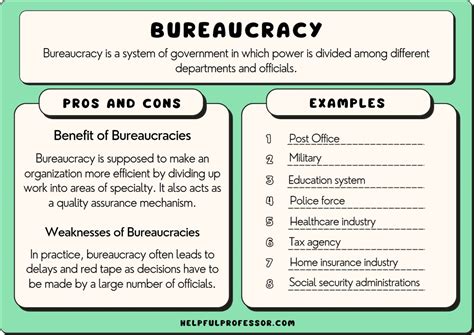Bureaucracy, an administrative apparatus within government organizations, plays a critical role in implementing policies and shaping societal outcomes. This intriguing entity has sparked considerable debate and analysis within the field of American Politics and Government (APGOV).

Understanding Bureaucracy
Bureaucracy, derived from the French words “bureau” (desk) and “cratie” (rule), refers to a hierarchical system of administrative departments that execute the functions of government. It is characterized by the following key features:
- Specialization: Employees are assigned specific tasks based on their expertise and qualifications.
- Hierarchy: Power and authority are distributed in a top-down manner, with clear lines of communication from superiors to subordinates.
- Impersonality: Decisions are made based on established rules and procedures, rather than personal biases or preferences.
- Formalization: Written rules and regulations govern bureaucratic operations, ensuring consistency and accountability.
Types of Bureaucracy
Bureaucracies can be classified into two broad categories:
- Line Bureaucracies: These are directly involved in implementing policies and providing services to the public, such as the Department of Defense or the Social Security Administration.
- Staff Bureaucracies: These provide support and expertise to line bureaucracies, such as the Office of Management and Budget or the Congressional Research Service.
Pros and Cons of Bureaucracy
Bureaucracies offer several advantages:
- Efficiency: Specialization and hierarchy enable bureaucracies to process large amounts of information and tasks quickly and effectively.
- Expertise: Bureaucratic employees possess deep knowledge and skills in their respective areas of responsibility.
- Stability: Formal rules and procedures provide predictability and consistency in government operations.
However, bureaucracies also have their drawbacks:
- Red Tape: Overly complex rules and procedures can lead to delays and frustration for both employees and citizens.
- Lack of Responsiveness: Bureaucratic inertia can make it difficult to adapt quickly to changing needs or challenges.
- Unaccountability: Employees may feel less responsible for their actions due to the impersonal and hierarchical nature of bureaucracies.
Weber’s Ideal Bureaucracy
Max Weber, a renowned sociologist, developed a model of the “ideal bureaucracy” characterized by the following attributes:
- Meritocracy: Employees are selected and promoted based on their qualifications and performance.
- Clear Hierarchy: Lines of authority and accountability are well-defined.
- Impersonal Rules: Decisions are made objectively, without bias or favoritism.
- Separation of Personal and Official Life: Employees’ personal lives are separate from their official duties.
Bureaucratic Discretion
Despite formal rules and procedures, bureaucrats often exercise discretion in their decision-making. This occurs when multiple interpretations of rules exist or when situations arise that are not explicitly covered by existing regulations. Bureaucratic discretion can be beneficial when it allows for flexibility and responsiveness, but it can also lead to inconsistency or abuse of power.
Bureaucracy and Democracy
The relationship between bureaucracy and democracy is complex and often debated. Some argue that bureaucracies, by virtue of their size and power, can threaten democratic principles by limiting public accountability and responsiveness. Others contend that bureaucracies are essential for implementing policies effectively and protecting citizens’ rights.
Bureaucracy and Interest Groups
Interest groups often seek to influence bureaucratic decision-making through lobbying and other forms of political engagement. This can sometimes lead to the capture of bureaucracies by particular interest groups, which can undermine public trust and impartiality.
Improving Bureaucratic Performance
Enhancing bureaucratic performance requires a multifaceted approach that includes:
- Streamlining Procedures: Simplifying rules and procedures to reduce red tape.
- Increasing Accountability: Establishing clear mechanisms for holding bureaucrats accountable for their decisions.
- Encouraging Flexibility: Providing bureaucracies with the authority to adapt to changing circumstances.
- Promoting Ethical Conduct: Fostering a culture of integrity and transparency within bureaucracies.
Conclusion
Bureaucracy is a pervasive and influential force in modern government. Its unique characteristics and challenges have been the subject of extensive study and analysis by political scientists and policymakers. Understanding the nature and role of bureaucracy is essential for navigating the complexities of government and ensuring its effectiveness and accountability.
